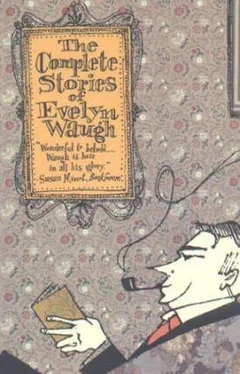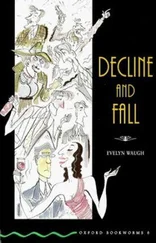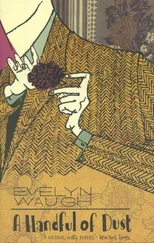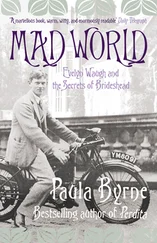Evelyn Waugh - The Complete Stories Of Evelyn Waugh
Здесь есть возможность читать онлайн «Evelyn Waugh - The Complete Stories Of Evelyn Waugh» весь текст электронной книги совершенно бесплатно (целиком полную версию без сокращений). В некоторых случаях можно слушать аудио, скачать через торрент в формате fb2 и присутствует краткое содержание. Год выпуска: 1998, ISBN: 1998, Жанр: Классическая проза, на английском языке. Описание произведения, (предисловие) а так же отзывы посетителей доступны на портале библиотеки ЛибКат.
- Название:The Complete Stories Of Evelyn Waugh
- Автор:
- Жанр:
- Год:1998
- ISBN:0-316-92546-2
- Рейтинг книги:3 / 5. Голосов: 1
-
Избранное:Добавить в избранное
- Отзывы:
-
Ваша оценка:
- 60
- 1
- 2
- 3
- 4
- 5
The Complete Stories Of Evelyn Waugh: краткое содержание, описание и аннотация
Предлагаем к чтению аннотацию, описание, краткое содержание или предисловие (зависит от того, что написал сам автор книги «The Complete Stories Of Evelyn Waugh»). Если вы не нашли необходимую информацию о книге — напишите в комментариях, мы постараемся отыскать её.
The Complete Stories Of Evelyn Waugh — читать онлайн бесплатно полную книгу (весь текст) целиком
Ниже представлен текст книги, разбитый по страницам. Система сохранения места последней прочитанной страницы, позволяет с удобством читать онлайн бесплатно книгу «The Complete Stories Of Evelyn Waugh», без необходимости каждый раз заново искать на чём Вы остановились. Поставьте закладку, и сможете в любой момент перейти на страницу, на которой закончили чтение.
Интервал:
Закладка:
The first phase of detachment had passed and had been succeeded by one of methodical investigation. Almost simultaneously with his acceptance of his continued existence had come the conception of pain—vaguely at first as of a melody played by another to which his senses were only fitfully attentive, but gradually taking shape as the tangible objects about him gained in reality, until at length it appeared as a concrete thing, external but intimately attached to himself. Like the pursuit of quicksilver with a spoon, Adam was able to chase it about the walls of his consciousness until at length he drove it into a corner in which he could examine it at his leisure. Still lying perfectly still, just as he had fallen, with his limbs half embracing the wooden legs of the chair, Adam was able, by conscentrating his attention upon each part of his body in turn, to exclude the disordered sensations to which his fall had given rise and trace the several constituents of the bulk of pain down their vibrating channels to their sources in his various physical injuries. The process was nearly complete when the arrival of his nurse dissolved him into tears and scattered his bewildered ratiocinations.
It was in some such mood as this that, an hour or so after his awakening, Adam strode along the towing path away from Oxford. He still wore the clothes in which he had slept, but in his intellectual dishevelment he had little concern for his appearance. All about him the shadows were beginning to dissipate and give place to clearer images. He had breakfasted in a world of phantoms, in a great room full of uncomprehending eyes, protruding grotesquely from monstrous heads that lolled over steaming porridge; marionette waiters had pirouetted about him with uncouth gestures. All round him a macabre dance of shadows had reeled and flickered, and in and out of it Adam had picked his way, conscious only of one insistent need, percolating through to him from the world outside, of immediate escape from the scene upon which the bodiless harlequinade was played, into a third dimension beyond it.
And at length, as he walked by the river, the shapes of the design began to advance and recede, and the pattern about him and the shadows of the night before became planes and masses and arranged themselves into a perspective, and like the child in the nursery Adam began feeling his bruises.
Somewhere among the red roofs across the water bells were ringing discordantly.
Two men were fishing on the bank. They looked curiously at him and returned their attention to their barren sport.
A small child passed him sucking her thumb in Freudian ecstasy. And after a time Adam left the footpath and lay down under a bank and by the Grace of God fell asleep.
III
It was not a long or an unbroken sleep, but Adam rose from it refreshed and after a little while resumed his journey.
On a white footbridge he paused, and lighting his pipe, gazed down into his ruffled image. A great swan swept beneath him with Spenserian grace, and as the scattered particles of his reflection began to reassemble, looking more than ever grotesque in contrast with the impeccable excellence of the bird, he began half-consciously to speak aloud:
“So, you see, you are after all come to the beginning of another day.” And as he spoke, he took from his pocket the envelope addressed to Imogen and tore it into small pieces. Like wounded birds they tumbled and fluttered, until reaching the water they became caught up in its movement and were swept out of sight round the bend of the river towards the city, which Adam had just left.
The reflection answered: “Yes, I think that that was well done. After all, ‘imperatrix’ is not a particularly happy epithet to apply to Imogen, is it? — and, by the way, are you certain that she can understand Latin? Suppose that she had had to ask Henry to translate it to her!
“But, tell me, does this rather picturesque gesture mean that you have decided to go on living? You seemed so immovably resolved on instant death yesterday, that I find it hard to believe you can have changed your mind.”
Adam: I find it hard to believe that it was I who yesterday was so immovably resolved. I cannot explain but it seems to me as though the being who survives, I must admit, with very great clearness in my memory, was born of a dream, drank and died in a dream.
The Reflection: And loved in a dream, too?
Adam: There you confound me, for it seems to me that that love of his alone does partake of reality. But perhaps I am merely yielding to the intensity of the memory. Indeed I think that I am. For the rest that being had no more substance than you yourself, whom the passage of a bird can dissolve.
Reflection: That is a sorry conclusion, for I am afraid that you are trying to dismiss as a shadow a being in every way as real as yourself. But in your present mood it would be useless to persuade you. Tell me instead, what was the secret which you learned, asleep there in the grass?
Adam: I found no secret—only a little bodily strength.
Reflection: Is the balance of life and death so easily swayed?
Adam: It is the balance of appetite and reason. The reason remains constant—the appetite varies.
Reflection: And is there no appetite for death?
Adam: None which cannot be appeased by sleep or change or the mere passing of time.
Reflection: And in the other scale no reason?
Adam: None. None.
Reflection: No honour to be observed to friends? No interpenetration, so that you cannot depart without bearing away with you something that is part of another?
Adam: None.
Reflection: Your art?
Adam: Again the appetite to live—to preserve in the shapes of things the personality whose dissolution you foresee inevitably.
Reflection: That is the balance then—and in the end circumstance decides.
Adam: Yes, in the end circumstance.
Continuation
They have all come over to Thatch for the day; nine of them, three in Henry Quest’s Morris and the others in a huge and shabby car belonging to Richard Basingstoke. Mrs. Hay had only expected Henry Quest and Swithin, but she waves a plump hand benignly and the servants busy themselves in finding more food. It is so nice living near Oxford, and Basil’s friends always look so charming about the place even if they are rather odd in their manners sometimes. They all talk so quickly that she can never hear what they are saying and they never finish their sentences either—but it doesn’t matter, because they always talk about people she doesn’t know. Dear boys, of course they don’t mean to be rude really—they are so well bred, and it is nice to see them making themselves really at home. Who are they talking about now?
“No, Imogen, really, he’s getting rather impossible.”
“I can’t tell you what he was like the other night.”
“The night you came down here.”
“Gabriel was giving a party.”
“And he didn’t know Gabriel and he hadn’t been asked.”
“And Gabriel didn’t want him—did you, Gabriel?”
“Because you never know what he is going to do next.”
“And he brought in the most dreadful person.”
“Quite, quite drunk.”
“Called Ernest Vaughan, you wouldn’t have met him. Just the most awful person in the world. Gabriel was perfectly sweet to him.”
Dear boys, so young, so intolerant.
Still, if they must smoke between courses, they might be a little more careful with the ash. The dark boy at the end—Basil always forgot to introduce his friends to her—was quite ruining the table.
“Edwards, give the gentleman next to Lord Basingstoke another ash-tray.”
Читать дальшеИнтервал:
Закладка:
Похожие книги на «The Complete Stories Of Evelyn Waugh»
Представляем Вашему вниманию похожие книги на «The Complete Stories Of Evelyn Waugh» списком для выбора. Мы отобрали схожую по названию и смыслу литературу в надежде предоставить читателям больше вариантов отыскать новые, интересные, ещё непрочитанные произведения.
Обсуждение, отзывы о книге «The Complete Stories Of Evelyn Waugh» и просто собственные мнения читателей. Оставьте ваши комментарии, напишите, что Вы думаете о произведении, его смысле или главных героях. Укажите что конкретно понравилось, а что нет, и почему Вы так считаете.












